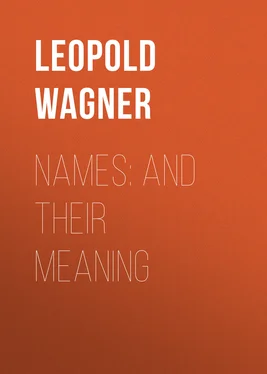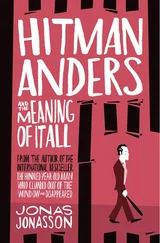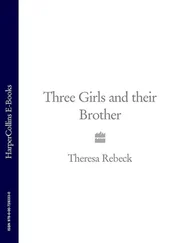Leopold Wagner - Names - and Their Meaning
Здесь есть возможность читать онлайн «Leopold Wagner - Names - and Their Meaning» — ознакомительный отрывок электронной книги совершенно бесплатно, а после прочтения отрывка купить полную версию. В некоторых случаях можно слушать аудио, скачать через торрент в формате fb2 и присутствует краткое содержание. Жанр: Эзотерика, foreign_religion, foreign_antique, на английском языке. Описание произведения, (предисловие) а так же отзывы посетителей доступны на портале библиотеки ЛибКат.
- Название:Names: and Their Meaning
- Автор:
- Жанр:
- Год:неизвестен
- ISBN:нет данных
- Рейтинг книги:3 / 5. Голосов: 1
-
Избранное:Добавить в избранное
- Отзывы:
-
Ваша оценка:
- 60
- 1
- 2
- 3
- 4
- 5
Names: and Their Meaning: краткое содержание, описание и аннотация
Предлагаем к чтению аннотацию, описание, краткое содержание или предисловие (зависит от того, что написал сам автор книги «Names: and Their Meaning»). Если вы не нашли необходимую информацию о книге — напишите в комментариях, мы постараемся отыскать её.
Names: and Their Meaning — читать онлайн ознакомительный отрывок
Ниже представлен текст книги, разбитый по страницам. Система сохранения места последней прочитанной страницы, позволяет с удобством читать онлайн бесплатно книгу «Names: and Their Meaning», без необходимости каждый раз заново искать на чём Вы остановились. Поставьте закладку, и сможете в любой момент перейти на страницу, на которой закончили чтение.
Интервал:
Закладка:
The cradle of the human race bears the name of Palestine, or in Hebrew Palestina , meaning “the land of strangers,” agreeably to the native word palash , to wander. Palestine is usually denominated the Holy Land, because it was the scene of the birth, life, and death of the Redeemer. Asia Minoris, of course, Lesser Asia.
For the title of Persiawe are indebted to the Greeks, who gave the name of Persis to the region (of which the capital was Persipolis ) originally overrun by a wild branch of the Ayrian race called the Parsa, meaning, in the native tongue, “the Tigers” [ see Parsees]. The suffix ia , wherever it occurs in a geographical sense, expresses the Celtic for land or territory. Hence, Persia signifies the territory of the Parsa or Parsees; Arabia, the country of the Arabs, “men of the desert”; Abyssinia, that of the Abassins, or “mixed races”; Kaffraria, that of the Kaffirs, or “unbelievers”; and Ethiopia, the “land of the blacks,” according to the two Greek words aithein , to burn, and ops , the face. Indiadenotes the country traversed by the Indus, or rather the Hindu , which name is a Persicized form of the Sanskrit Sindhu , “a great river,” rendered Hindus in the Greek. Synonymous with the Celtic suffix just discussed is the Persian stan : consequently Hindustansignifies the territory traversed by the river Hindu , and peopled by the Hindoos; Turkestan, the country of the Turks; Afghanistan, that of the Afghans; Beloochistan, that of the Belooches; and Kurdestan, properly Koordistan, that of the Koords. The term Chinais a western corruption of Tsina, so called in honour of Tsin, the founder of the great dynasty which commenced in the third century b.c., when a knowledge of this country was first conveyed to the Western nations. It was this Tsin who built the Great Wall of China (or Tsin) to keep out the Barbarians. The Chinese Empire bears the description of the Celestial Empirebecause its early rulers were all celestial deities. Siberiais a term indicative of Siber , the residence of Kutsheen Khan, the celebrated Tartar prince, recognized as the ancient capital of the Tartars, the ruins of which may still be seen. Here again the Celtic suffix ia has reference to the surrounding territory.
Russiaconstituted the country of the Russ, a tribe who overran it at a very early period. The Russian Empire was founded by Ruric, or Rourik, a Scandinavian chief whose death took place in the year a.d., 879. Circassiadenotes the country of the Tcherkes, a Tartar tribe who settled in the neighbourhood of the river Terck. The Crimeareceived its name from a small town established in the peninsula by the Kimri, or Cymri, and known to the Greeks as Kimmerikon . Finlandis properly Fenland, “the land of marshes.” Swedenis a modern term made up of the Latin Suedia , signifying the land of the Suevi, a warlike tribe of the Goths, and the Anglo-Saxon den , testifying to its occupation by the Danes. Norway shows the result of a gradual modification of the Anglo-Saxon Norea , and the original Nordoe , being the Scandinavian for “north island.” It is easy to understand in this connection how the old Norsemen, deterred by the intense cold of the Arctic Sea, took it for granted that the great northern peninsula was surrounded by water, without actually determining the fact. The native name of this country in modern times is Nordrike , i.e. , the north kingdom.
Britainwas known to the Phœnicians as Barat-Anac , or “the land of tin,” as far back as the year 1037 b.c. Some five hundred years afterwards the Island was alluded to by the Romans under the name of Britannia, which subsequently became shortened into Britain. Englandwas originally Engaland , the land of the Engles, or Angles, who came over from Sleswick, a province of Jutland. Prior to the year 258, which witnessed its invasion by the Scoti, a tribe who inhabited the northern portions of the country now known as Ireland, Scotlandbore the name of Caledonia, literally the hilly country of the Caels, or Gaels. The word Cael, or Gael, is a corruption of Gadhel , signifying in the native tongue “a hidden rover”; while Scot, derived from the native scuite , means practically the same thing, i.e. , a wanderer. The Caledonians were the inhabitants of the Highlands, the termination dun expressing the Celtic for a hill, fort, stronghold; the Scots were the invaders from Scotia, who appropriated the Hebrides and the Western Islands; whereas the Lowlanders were the Picts, so called from their description by the Romans, picti , painted men. These Picts were eventually subdued by the Caledonians and Britons from their respective sides. The Gaelic designation of what is now Irelandwas Ierne , indicative of the “western isle.” Ireland is commonly styled The Emerald Isleowing to its fresh verdure.
Wales was originally Cambria, so called on account of the Cymri, or Kimri, who peopled it. The modern title of Waleswas given to this province by the Anglo-Saxons, because they regarded it, in common with Cornwall, as the land of foreigners. Traces of the Wahl or Welsh still present themselves in such names as Wallachia, Walcheren, Walloon, Wallingford, Welshpool, &c. Thus we see that the prenomen Wahl , subject to slight modifications in the spelling, denotes any foreign settlement from the Saxon point of view. The Saxons, by the way, whose original settlement is determined by the little kingdom of Saxony, derived their name from the seax , or short crooked knife with which they armed themselves.
France was known to the Greeks as Gallatia , and to the Romans as Gallia , afterwards modified into Gaul, because it was the territory of the Celtiæ, or Celts. The modern settlers of the country were the Franks, so called from the franca , a kind of javelin which they carried, who in the fifth century inhabited the German province of Franconia, and, travelling westwards, gradually accomplished the conquest of Gaul. France, therefore, signifies the country of the Franks, or, as the Germans call it, Frankreich , i.e. , the Kingdom of the Franks. All the western nations were styled Franks by the Turks and Orientals, and anything brought to them from the west invariably merited a prenomen descriptive of its origin, as, for example, frankincense, by which was meant incense brought from the country of the Franks. Normandyindicates the coast settlement of the Northmen, or Danes; while Brittanycomprised the land appropriated by the kings of Britain.
Germanywas in ancient times known as Tronges, or the country of the Tungri, a Latin word signifying “speakers”; but the Romans afterwards gave it the name of Germanus, which was a Latinized Celtic term meaning “neighbours,” originally bestowed by the Gauls upon the warlike people beyond the Rhine. Hollandis the modern acceptation of Ollant , the Danish for “marshy ground”; whereas Belgiumdenotes the land of the Belgiæ. The fact that the term Netherlandsis expressive of the low countries need scarcely detain us. Denmarkis properly Danmark, i.e. , the territory comprised within the marc , or boundary established by Dan, the Scandinavian chieftain. Jutlandmeans the land of the Jutes, a family of the Goths who settled in this portion of Denmark. Prussiais a corruption of Borussia , the country of the Borussi; and Bohemia, the country of the Boii, just as Hungarywas originally inhabited by the Huns, a warlike Asiatic family, who expelled the Goths from this territory in the year 376. These Huns were first heard of in China in the third century b.c. under the name of Hiong-nu , meaning “giants.” Polandis an inversion of Land-Pole , the Slavonic for “men of the plains,” who first overran this territory.
Читать дальшеИнтервал:
Закладка:
Похожие книги на «Names: and Their Meaning»
Представляем Вашему вниманию похожие книги на «Names: and Their Meaning» списком для выбора. Мы отобрали схожую по названию и смыслу литературу в надежде предоставить читателям больше вариантов отыскать новые, интересные, ещё непрочитанные произведения.
Обсуждение, отзывы о книге «Names: and Their Meaning» и просто собственные мнения читателей. Оставьте ваши комментарии, напишите, что Вы думаете о произведении, его смысле или главных героях. Укажите что конкретно понравилось, а что нет, и почему Вы так считаете.












